- Islamic creed
- /
- Creed and Quran Miraculousness
The lust for money:
Dear brother, this is lesson number 21 of the series Creed and the Inimitability of Quran. In the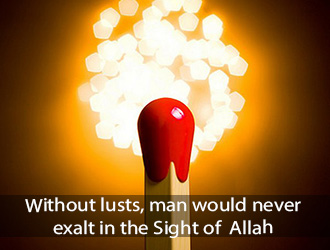 previous lecture we tackled the topic "Lust", and I mentioned to you through a series of lectures that lusts are neutral, and they can be means to exalt or to fall, and that without lusts, man will never exalt in the Sight of the Lord of the heavens and the earth. Then we tackled so many subtopics related to the topic "Lust". Let us move now to one of the most inciting desires in life which is money. Allah says:
previous lecture we tackled the topic "Lust", and I mentioned to you through a series of lectures that lusts are neutral, and they can be means to exalt or to fall, and that without lusts, man will never exalt in the Sight of the Lord of the heavens and the earth. Then we tackled so many subtopics related to the topic "Lust". Let us move now to one of the most inciting desires in life which is money. Allah says: ﴾Beautified for men is the love of things they covet; women, children, much of gold and silver (wealth), branded beautiful horses, cattle and well-tilled land. This is the pleasure of the present world's life﴿
1- Money is the backbone of life:
oney is one of the most inciting lusts Allah has installed in man, and it is one of the greatest means to draw close to Allah the Almighty. First of all, it is a fact that money is the backbone of life, for when you make a living, you will earn lawful money with which you can buy a house, get married, have children and live in happiness with your family. This entire project in your life is able to come true by making a living, so money is the backbone of life.Dear brother, the role of money in the believer's life should be clear to him. The first point regarding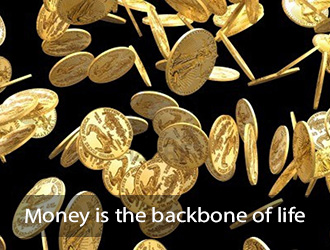 this context: The prophet PBUH said:
this context: The prophet PBUH said:
((The strong believer is more beloved to Allah than the weak believer, but there is goodness in both.))
Since money is the backbone of life, you ought to earn it in lawful ways and according to Allah's Method. Money is also power in the sense that money makes your options limitlessly open in offering good deeds. The rich might use his money to help a young man get married, to treat a poor patient, to support a widow, to sponsor an orphan, to establish an institute, to build an orphanage and to offer all sorts of good deeds. Therefore, the options are open for the rich person to offer good deeds. Moreover, the Prophet PBUH put the rich believer in a level close to the level of the knowledgeable sincere caller to Allah.
((There shall be no envy but (emulate) two: the person whom Allâh has given wealth and the power to spend it in the service of Truth, and the person whom Allâh has granted knowledge of 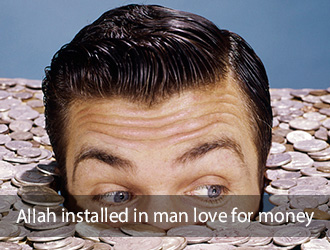 things and he judges by it and teaches it (to sh3er).))
things and he judges by it and teaches it (to sh3er).))
﴾And give not unto the foolish your property which Allah has made a means of support for you, but feed and clothe them therewith, and speak to them words of kindness and justice.﴿
The part of the Ayah I am referring to is the following:
﴾And give not unto the foolish your property which Allah has made a means of support for you﴿
Allah says that He made money (property) a supporting means to you. Namely, your life depends on making a living in order to buy food to your family, to buy clothes or to lease a house, and this is how money is the backbone of life. I never believe a man whoever claims that he does not love money since Allah has installed in man the lust for money, and this lust is deeply rooted in man's ownself, but some people admit that, while sh3er do not. Thus, the lust for money has been installed in man whether he admits that or not and whether he declares such a fact or conceals it. Hence, the first fact about money is that it is the backbone of life, so do not despise it as it is considered one of the greatest Divine Graces if it is earned and spent lawfully.
2- Money is a neutral element:
Dear brother, another important point with regard to the concept of money: Money is a neutral means, so if we ask, is affluence a good thing? The answer is yes and no, but how is that? If money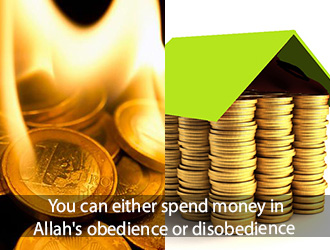 is spent on obeying Allah, it is good, but if it is spent on sinning, it is evil. Therefore, money is neither a grace nor a curse, but it is valued according to the way it is spent and the way it is earned as well. Man on the Day of Resurrection will be asked about how he earned his wealth and how he spent it, about he spent his life and youth and about how he make use of his knowledge. Well, concerning his wealth he will be asked two questions: How did he earn it? How did he spend it?
is spent on obeying Allah, it is good, but if it is spent on sinning, it is evil. Therefore, money is neither a grace nor a curse, but it is valued according to the way it is spent and the way it is earned as well. Man on the Day of Resurrection will be asked about how he earned his wealth and how he spent it, about he spent his life and youth and about how he make use of his knowledge. Well, concerning his wealth he will be asked two questions: How did he earn it? How did he spend it?
Dear brother, the foremost fact is that money is the backbone of life, because when every man is secured financially, he will feel safe. Also, money is the financial means to meet the basic needs of man which are food and drink, sex and self-esteem, and these three needs are Divinely installed in man, so that he would strive to get money and make a living. These needs manifest the human nature and when Allah describes the Prophets as human beings, He says:
﴾And We never sent before you (O Muhammad) any of the Messengers but verily, they ate food and walked in the markets﴿
Since Prophets are human beings, they are in need of food, and in order to buy food they need money to pay for it, and also they need to go to the market in order to buy it (i.e. they need to work). Accordingly, there is no place in Muslim society for the idle man who has no job. Our master Umar said, "When I see the man who physically strong, I admire him, but after I know that he is jobless, I belittle him".
Making a living and mastering a craft are acts of worship and obedience to Allah:
First of all let me assure you that every one of you can make an act of worship out of his job, his 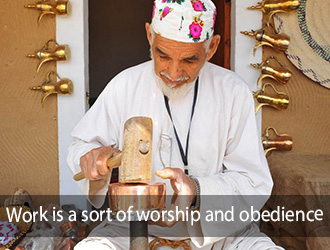 craft, his career, his movement in life and his walking in markets from which he makes his living. This can happen when his job is lawful, when the daily practice of his career (or business) is lawful and is not based on lying, deceiving, cunning, swindling or fraud, when he does not nullify other's bargain in order to buy it himself, when he does not haste to buy an imported commodity before anyone else so that he can sell it at high prices, and when he does not hide any flaws in his goods.
craft, his career, his movement in life and his walking in markets from which he makes his living. This can happen when his job is lawful, when the daily practice of his career (or business) is lawful and is not based on lying, deceiving, cunning, swindling or fraud, when he does not nullify other's bargain in order to buy it himself, when he does not haste to buy an imported commodity before anyone else so that he can sell it at high prices, and when he does not hide any flaws in his goods.
Hence, when the believer survives all the sins of buying and selling, when his career is basically lawful (like selling fabrics, food, drinks, wood or iron as long as what he sells is a lawful good), when his daily practice in his business is lawful and when his intention in working is to meet his needs and his family needs and to serve Muslims, his business will become an act of worship.
By Allah dear brother, our pious ancestors used to say upon opening their stores, "I intend to serve Muslims". Whoever does the same will be in a continuous act of worship when he spends 8 hours in his store, won't he? This is because he intends to meet his and his family needs. It was said, "How great the wealth is as long as it helps me protect my honor and get closer to my Lord." I repeat, when man intends to serve Muslims through his career and when his craft, business, job, medicine, law office, engineering career or teaching does not distract him from offering his acts of worship, fulfilling his duties or offering a good deed, this career will turn into an act of worship. Thus, we can say that the daily activities of the believer become acts of worship.
Is there any adult on earth who does not work? If there is someone, then it is a rare case. Look at the streets in the early morning, you will find people of all backgrounds (the believer, the disbeliever, the hypocrite and the upright) heading to somewhere; one of them to his school to teach, the other one to his factory to work, a third one to his law office or a fourth man to his clinic. Therefore, everyone is heading to his work, but the difference is that some of them make their jobs means to exalt to the highest ranks and to enter Paradise.
Dear brother, the paths to Allah are as many as the number of people on earth, and you can make your job, in your store, company, engineering office, clinic, field, or factory, as your means to exalt, provided this job is lawful, you use lawful ways to practice it (you should not lie, swindle, hide flaws, fraud, monopolize, praise your good with something it lacks, deceive, haste to by goods before anyone to sell them at high prices or nullify other's bargain in order to buy it yourself), you work to meet your family needs, you intend to serve Muslims and your work never prevents you from offering your acts of worship, duties and good deeds. Only then your job will become an act of worship itself. From this perceptive, the believer's habitual activities turn into acts of worship, whereas the hypocrite's turn into sins.
Dear brother, money is a neutral factor, and I emphasize this fact. As I said earlier its value is derived from the way you earn it and the way you spend it. Money is a grace and a curse, and it is a means to exalt or to hit rock bottom. The proof is in the following Ayah:
derived from the way you earn it and the way you spend it. Money is a grace and a curse, and it is a means to exalt or to hit rock bottom. The proof is in the following Ayah:
﴾As for man, when his Lord tries him by giving him honour and gifts, then he says (puffed up): "My Lord has honoured me."﴿
Allah honors man by abundant provision. The word grace reminded me of a stance that a notable companion took.
((The infidels of Quraish arrested our master Khubaib, may Allah be pleased with him, and he was crucified on a trunk of palm tree, and before he has been killed, he was asked: "do you prefer that Muhammad be in your place?" He said: "I swear to Allah that I will never let the Messenger get hurt by a thorn, while I am sitting with my children, enjoying all the luxury and health of the worldly life."))
How wonderful it is to be with your young wife and children, to have the luxury and health of the worldly life such as having good health and enjoy the air conditioning with a bouquet of roses and many kinds of fruits. Nevertheless, that noble companion refused those things and said, "I swear to Allah that I will never let the Messenger get hurt by a thorn, while I am sitting with my children, enjoying all the luxury and health of the worldly life." Upon hearing that, Abu Sufyan said, "I have not seen anyone loves his friend the way the companions of Muhammad love him." The reaction of that reflects the true Islam, which is based on love. Allah says:
﴾As for man, when his Lord tries him by giving him honour and gifts,﴿
3- Earning lots of money does not mean that Allah loves that rich servant:
There are less important things in life which belong to extravagant and luxurious life. Thus, if man cannot eat some sorts of expensive and rare fruits he will not die out of hunger, will he? But man has the option to buy these sorts of fruits.
﴾As for man, when his Lord tries him by giving him honour and gifts, then he says (puffed up): "My Lord has honoured me."* But when He tries him, by straitening his means of life, he says: "My Lord has humiliated me!"﴿
Man usually tends to have such a claim, but Allah the Almighty does not accept it:
﴾Nay!﴿
﴾Verily, Qarun (Korah) was of Musa's (Moses) people, but he behaved arrogantly towards them. And We gave him of the treasures, that of which the keys would have been a burden to a body of strong men. When his people said to him: "Do not be glad (with ungratefulness to Allah's Favours). Verily! Allah likes not those who are glad (with ungratefulness to Allah's Favours).﴿
﴾So he went forth before his people in his pomp﴿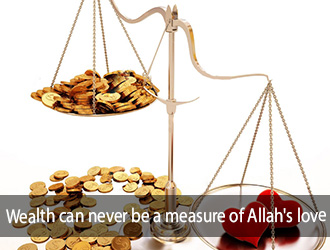
﴾So We caused the earth to swallow him and his dwelling place﴿
﴾As for man, when his Lord tries him by giving him honour and gifts, then he says (puffed up): "My Lord has honoured me." But when He tries him, by straitening his means of life, he says: "My Lord has humiliated me!"﴿
The Divine Answer is:
﴾Nay!﴿
"Nay" here is a negative form and a deterrent one. To make this negative form consider the different answers when you is asked these two different questions. If someone hungry asks you, "Are you hungry?" You will simply answer by saying, "No, I am not", but if he asks you, Allah forbid, "Are you a thief?", answering this question with "No" is not enough for you, so you say "Nay" denying that strongly meaning that you never think of stealing, you never accept it and you never approve it. Hence, when Allah says: "Nay", as if Allah were saying, "My bestowal is not honoring, but rather it is a test, and my withdrawal is not humiliation, but rather it is a treatment". The proof is in the following Ayah:
﴾As for man, when his Lord tries him by giving him honour and gifts, then he says (puffed up): "My Lord has honoured me."﴿
4- Spendng money in the Cause of Allah is one of the means to draw closer to Him:
Dear brother, you should know beyond doubt that money is one of the greatest means to draw close to Allah by spending it in the right cause (for the Sake of Allah).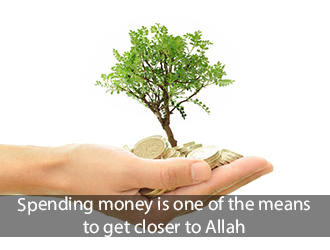 Allah says:
Allah says:﴾It is not Al-Birr (piety, righteousness, and each and every act of obedience to Allah, etc.) that you turn your faces towards east and (or) west (in prayers); but Al-Birr is (the quality of) the one who believes in Allah, the Last Day, the Angels, the Book, the Prophets and gives his wealth, in spite of love for it, to the kinsfolk, to the orphans, and to Al-Masakin (the poor), and to the wayfarer, and to those who ask, and to set slaves free﴿
﴾ and gives his wealth, in spite of love for it,﴿
The meaning of "and gives his wealth, in spite of love for it":
Scholars of interpretation said, "The phrase 'and give his wealth, in spite of love for it' has two 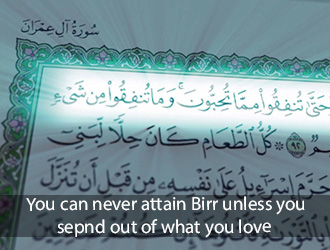 meanings. The first meaning is that he gives his wealth in spite of love for money, and the second meaning is that he gives money because he loves Allah." Anyway:
meanings. The first meaning is that he gives his wealth in spite of love for money, and the second meaning is that he gives money because he loves Allah." Anyway:
﴾ By no means shall you attain Al-Birr (piety, righteousness, etc., it means here Allah's Reward, i.e. Paradise), unless you spend (in Allah's Cause) of that which you love ﴿
Both meanings are right.
﴾And gives his wealth, in spite of love for it, to the kinsfolk, to the orphans, and to Al-Masakin (the poor), and to the wayfarer, and to those who ask, and to set slaves free﴿
Pay attention to the following:
﴾Performs As-Salat (Iqamat-as-Salat), and gives the Zakat﴿
﴾And gives his wealth, in spite of love for it, to the kinsfolk, to the orphans, and to Al-Masakin (the poor), and to the wayfarer, and to those who ask, and to set slaves free, performs As-Salat (Iqamat-as-Salat), and gives the Zakat﴿
Dear brother based on the aforementioned fact, one of the greatest means to draw close to Allah the Almighty is to spend money for the Sake of Allah. It was reported in the relic:
((Allah asks the servant on the Day of Resurrection, "O My servant, I gave you money, so what did you do with it?" The servant says, "O Lord, I did not spend anything from it fearing that my children may become poor after my death." Allah the Almighty, says, "Did you not know that I am the All-Provider, Owner of Power, the Most Strong? Verily, the poverty that you feared has befallen them." Allah says to another servant, "O My worshiper! I gave you money, so what did you do with it?" The worshiper says, "O Lord! I spent it on the poor and the needy, because I am pretty sure that You are the Best to guard, and You are the Most Merciful of those who show mercy." Allah says, "O My worshiper! I am the Guard of your children after your death."))
﴾and gives his wealth, in spite of love for it ﴿
5- Money is power
Spending money for the Sake of Allah is one of the greatest means to draw close to Him, and money is power:
((The strong believer is better and more beloved to Allah than the weak believer))
If there is a young man who is upright and pious but does not own a house, and if there is a young believer woman who is Quran Hafiza (the female memorizer of the Noble Quran), but no one has proposed to her yet, a rich man can provide both with a house and help them get married. By such deed he is establishing a religious family and this is considered a very great deed. In my view, there is no greater deed than solving the youth's problems. When you facilitate marriages, you bring together two young people in the bond of marriage by which they are both protected, become chaste and lead a happy life. Thus, money is power. By money you can also establish a charity project, build an orphanage, sponsor a religious institute or participate in building a medical clinic for free treatment, but you have to keep in mind that it is fine to long to be rich as long as your money is lawfully earned and according the Divine Method. However, if being rich will be at the expense of your religion, principles and values, then poverty is a medal of honor on your chest. If you can be rich without violating Allah's Method, it is recommended to be so, because you will become more powerful and the options for offering good deeds will be countless and widely open in front of you.
As the powerful pious person who is able to enforce the truth, refute falsehood, appoint the sincere and brush away the hypocrite at the stroke of a pen, the rich person can use his money to help the needy and fill their heart with love to him.
((O Dawood, remind my servants of my blessings, as souls are molded to like the benefactor and hate the hurtful.))
6- Owning money is a big responsibility:
In addition to being the greatest means to draw close to Allah, money is a big responsibility. By the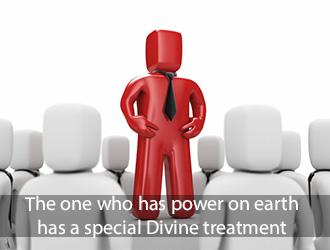 way, having power in the land can be in every domain; one can have power in the land by using the means he has in the Cause of Allah, so if you are rich, you can use your money for the right cause, if you are powerful, you can use your power for the right cause and if you are a scientist, you can use your knowledge. The one who has power in the land has a special Divine Treatment. In other words, when he does good deed, he will be rewarded twice, but if he does evil, he will be punished twice.
way, having power in the land can be in every domain; one can have power in the land by using the means he has in the Cause of Allah, so if you are rich, you can use your money for the right cause, if you are powerful, you can use your power for the right cause and if you are a scientist, you can use your knowledge. The one who has power in the land has a special Divine Treatment. In other words, when he does good deed, he will be rewarded twice, but if he does evil, he will be punished twice. Whenever Umar Ibn Al-Khattab, may Allah be pleased, enjoined something he used to gather his family and address them by saying, "You should know that I enjoined this and that on people and forbade them from this and that, so people will now look at you just as bird looks at meat. If you come to grab it, they will grab with you, and if you refrain, they refrain. If I issue an order prohibiting something on people, then you must be the first to refrain from it. By Allah, if any one of you is brought to me, having done what I have ordered people to refrain from, I will double his punishment because of his relation to me so it is all up to you." Accordingly, being a relative of Umar was a burden.
The rich person, who offers a good deed, will be rewarded twice; once for him and the other once for those who follow his steps, given people usually look up to rich people and copy them in everything they, do because they belong to the high class in any society. Thus, if a poor person imitates a rich person in committing sins, the rich man will be punished twice, once for him and once for the one who imitated him. On the other hand, if a poor person imitates a rich one in obeying Allah, the latter will be rewarded twice.
One of the most outstanding saying I have ever heard is the following, "Justice is good, but it is better when it is established by rulers (the fair ruler is the best thing in life), generosity is good, but it is better when it is a trait of rich people, repentance is good, but it is better in youth, patience is good but it is better when poor people manifest it and Haya' (modesty) is good, but it is better when it is shown in women".
Dear brother, owning money entails responsibility. What would you say about a man who sacrifices his life and died as a martyr? He gave the most valuable thing man has (i.e. his life). Regarding this point, a poet said:
Sacrificing the soul is the ultimate charity
((All the sins of (Shaheed) a martyr are forgiven except debt))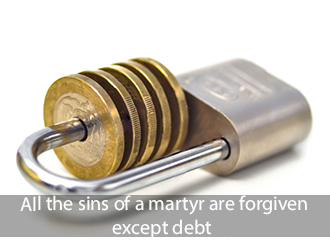
People's rights are built on justice whereas Allah's rights are built on forgiveness.
((Abu Barzah (may Allah be pleased with him) reported: Messenger of Allah (PBUH) said, "Man's feet will not move on the Day of Resurrection before he is asked about his life, how did he consume it, his knowledge, what did he do with it, his wealth, how did he earn it and how did he dispose of it, and about his body, how did he wear it out."))
I paid a friend of mine a visit once, and his father was there, so he said to me, "I am 96 years old, and yesterday I had some blood tests, and everything is normal". Then he said, "By Allah, I never earned unlawful money, and never had any unlawful affair." Indeed, he, who lives piously lives able-bodied."
((O Sa'd, consume lawful things and your supplications will be heard))
Allah will bestow benediction (Barakah) upon the food which is bought by Halal money that is earned from lawful ways.
By Allah dear brother, Divine Benediction makes the limited income enough, whereas sins and 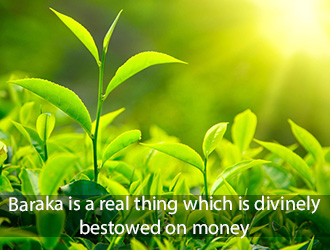 errors make the unlimited income insufficient. The word "Benediction" is not included in calculators with which you calculate numbers, but you should know that benediction is real, and it is Divinely bestowed upon those who earn their living lawfully.
errors make the unlimited income insufficient. The word "Benediction" is not included in calculators with which you calculate numbers, but you should know that benediction is real, and it is Divinely bestowed upon those who earn their living lawfully.
There is also what is called "The passive Rizq (provision)", but how is that? consider the situation when Allah protects your health and the health of your children, which is actually provision, because, Allah forbid, if any disease afflicts any member of your family, you will pay thousands of Liras to treat him. Medications can be very expensive, and there is an injection which costs 100.000 Liras, and it is used to treat cancerous tumors. The patient needs one injection every month.
Hence, when man is upright, his income is lawful and he uses his Halal money in buying his food,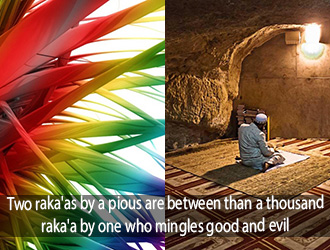 Allah will reward him with the passive Rizq by keeping him and his family healthy and by protecting his store from being burnt, and his house from being wrecked and by warding off any oppressor who might take all his belongings. The Prophet PBUH said:
Allah will reward him with the passive Rizq by keeping him and his family healthy and by protecting his store from being burnt, and his house from being wrecked and by warding off any oppressor who might take all his belongings. The Prophet PBUH said:
((They do not break their covenant with Allah and His Messenger, but Allah will enable their enemies to overpower them and take some of what is in their hands. Unless their leaders rule according to the Book of Allah and seek all good from that which Allah has revealed, Allah will cause them to fight one another.))
You can notice how western countries have despoiled the treasures of other nations in a way or another.
Dear brother, man will be held responsible for every penny he earns and spends, and he will be reckoned for it. The Prophet PBUH found a date-fruit on his bed so he said to Aishah:
((O Aishah, were it not for my doubt that this might have been given in charity, I would have eaten it.))
He longed to eat it, but he doubted that it might have been given in charity.
((Narrated in the authority of Amr Bin Shu'aib, by his father, by his grandfather, that the prophet PBUH once was sleeping when he found a date under his side, so he grabbed it and ate it, later on he felt restlessness late at night, so he woke up and said to his wife, "I found a date under my side and ate it, and I have doubts that it might have been given in charity.))
The Prophet PBUH said:
((Two Rak'at (of Prayer performed) by a pious person are far better than a thousand Rak'at by someone who mingles (good deeds with evil ones).))
Dear brother, we need to comprehend the concept of money deeply and to understand the philosophy of money in Islam. Money is the backbone of life, it is endeared to man, it is means to sublime or fall, it is a big responsibility and it is one of the greatest means to draw close to Allah the Almighty. This is the philosophy of money in Islam.
7- Money should not be means to brag about, to be proud of or to be superior to sh3er:
When man believes that money exists for his pleasures, that and that money is for extravagance, vanity, lavishness and supereminence, then he should know that thinking like that reflect mental disorder. It is reported in the relic:
((People will be line up in four groups on the Day of Resurrection: The group of people who earn their money lawfully but spend it on sins (like spending it on the green tables of gambling at red nights), and for those it will be said: "Take them to Hellfire" (The sinners' reckoning is very easy for they will go straight to Hell), the group of people who earn their money unlawfully (like earning it from owning a night club where there are singers, wines and dancers), but they spend it lawfully (like spending it on buying a house and the reckoning of those is so easy, for they will go straight to Hell), and for those it will be said: "Take them to Hellfire", the third group of people, we seek refuge with Allah to be among them, are the ones who earn their money unlawfully and spend it unlawfully and to those it will be said: "Take them to Hellfire", and the fourth and last group of people are the ones who earn their money lawfully and spend them lawfully and to them it will be said: "As for those, ask them about their money"))
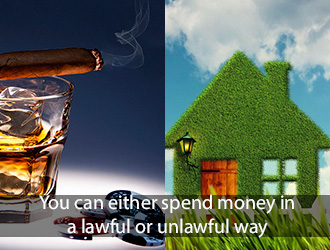 The first three groups will have a quick reckoning, whereas the fourth one will be asked for every detail, and whoever belongs to this group will be asked, was he haughty among his people? Man might show off about where he lives by asking sh3er where they live, given he lives in a very classy neighborhood in an 80 million worth house which makes the other person entirely embarrassed because of his humble or poor neighborhood. A man, who lives in a poor neighborhood called "Al-Hajar Al-Aswad" (black stone), was invited to a house in a very classy neighborhood (in East Malki neighborhood), and upon being asked where he lived, he answered, "I
The first three groups will have a quick reckoning, whereas the fourth one will be asked for every detail, and whoever belongs to this group will be asked, was he haughty among his people? Man might show off about where he lives by asking sh3er where they live, given he lives in a very classy neighborhood in an 80 million worth house which makes the other person entirely embarrassed because of his humble or poor neighborhood. A man, who lives in a poor neighborhood called "Al-Hajar Al-Aswad" (black stone), was invited to a house in a very classy neighborhood (in East Malki neighborhood), and upon being asked where he lived, he answered, "I live in Black Stone", so he said it in English making it sound like a very classy complex or neighborhood, because the majority of rich people evaluate other people according to their house's size, neighborhood and income. Bear in mind that whoever wanders in haughtiness because of his money is but a speaking devil.
live in Black Stone", so he said it in English making it sound like a very classy complex or neighborhood, because the majority of rich people evaluate other people according to their house's size, neighborhood and income. Bear in mind that whoever wanders in haughtiness because of his money is but a speaking devil.
By Allah dear brother, you can sooth the heart of any person by choosing your words while talking to him. Once I paid one of our brother a visit, and his guestroom was very small to such an extent that four persons could barely fit in it, so he was embarrassed, but I said, "O son, the Prophet PBUH, who is the Master of mankind and the endeared to Al-Haqq (Allah the Judge), lived in a room that could not fit him whenever he wanted to pray and his wife was asleep, so she had to move aside to give 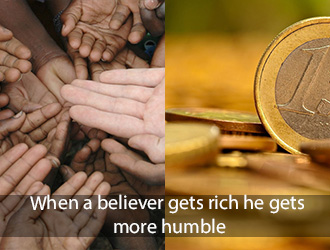 him some space. Remember, he is the master of mankind."
him some space. Remember, he is the master of mankind."
Some people visited our Master Abu Ubaidah bin Al-Jarrah (the commander of Islamic armies) to find out that he lived in a room where there were a buck skin and a water pot with a loaf of bread on it. He was sitting on a buck skin and his sword was hanged on the wall, so they were surprised, and they asked him, "What is this?" To which he said, "These are worldly goods to help us maintain our life, and they are more than enough for what the worldly life worth." Some people get arrogant because of their money, and they take pride in what they own, they boast about their money and they look down on people, but those should know that Allah is Great.
A young man proposed to the daughter (to be his bride) of a respectful man who used to live in Gulf, and who has a successful commerce, so the rich father asked the young man, "How much do you make a month?" The young man answered, "I make 50.000 Liras". The father of the young woman said arrogantly, "My daughter spends this sum of money in one day." Time passed and the worldly life showed the father of that young woman its ugly face, so his properties were impounded, and he had to ask that very young man, whom he treated with arrogance, to hire him, and accepted to appoint him as an accountant. Allah is Great, so beware of being self-conceited.
It was narrated in an allegorical story that while a man who was sitting with his wife eating chicken, a beggar knocked the door. Upon seeing him, the wife wanted to give him a piece of the food, but her husband rebuked her and prevented her from doing so. He said, "Fire him." As years passed, the relation between the couple got bad, and the husband divorced her. After a period of time someone else proposed to her, and one day while she was sitting with him and eating chicken, the door knocked, and upon seeing who was at the door, she got back very upset. Her husband said, "Who knocked the door?" She said, "The beggar." He said, "Do you him?" She got confused and said, "He is my ex-husband." He said, "Do you know who I am? I am the first beggar."
Allah is Great, so beware of being boastful about your money. A notable brother said to me once, "I had a factory, a big car for travel, another car for daily use, a car for the factory use, and I used to buy confections and fruits in abundance". He went on and on talking about his life in the past, but he swore to Allah that he is searching the rubbish containers for food. It is a long real story, so beware of being haughty. When the believer gets rich, he gets more humble to Allah and to poor people. How great the charity is when the rich man gives it the poor, and what is greater than that is refusal of the poor from taking the money of the rich out of self-respect.
The summary:
We will continue this topic inshaalah. I would like to address the youth: Seek your living (and be rich) in lawful ways according to the Divine Method, and use your money in solving the problems of Muslims, but if earning money will be at the expense of your religion and values, then poverty is a medal of honor on your chest. This is our topic in a nut shell.
The scientific topic:
Wheat:
1- The kinds of wheat:
Dear brother, let us move to the scientific topic. Allah has made wheat a nutritious food for mankind. How many kinds of wheat are there? There are 45.000 kinds as a professor at the university told me.
2- Wheat is a nutritious food:
Wheat is a nutritious food, and it grows everywhere; in plain land, on mountains, in valleys, in cold climate, in hot climate, in moderate climate and on the surface of the ground, and it grows at any time. Furthermore, the wheat stalk is a nutritious food for livestock. Wheat is the foremost food and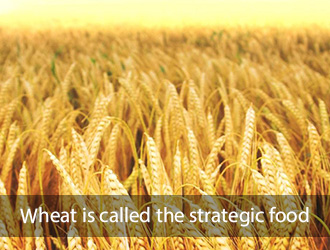 it is called in economics "The strategic food". The price of chaff is determined internationally. Thus wheat is a nutritious food for man, and wheat stalks are a nutritious food for animals.
it is called in economics "The strategic food". The price of chaff is determined internationally. Thus wheat is a nutritious food for man, and wheat stalks are a nutritious food for animals.
﴾(To be) a provision and benefit for you and your cattle.﴿
A secular man once fished in troubled water after a lecture I delivered in which I mentioned the amazing creation of the mosquito. He said to me cynically, "According to Islam, if a fly falls in a vessel, we should deluge its both wings, because one of them has the disease and the other has the cure". Then he said, "Does the same go for the mosquito?" I answered, "If a doctor convinced you of eating the apple with its skin, does the same go for watermelon?"
﴾And those who, when an oppressive wrong is done to them, they take revenge.﴿
3- The parts of wheat grain:
Dear brother, every whole wheat grain consists of 3 parts: bran, endosperm and germ. The bran 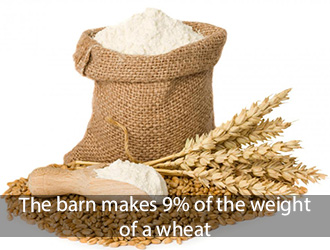 makes 9 % of the entire grain weight, and it has a very thin layer which makes only 3 % of its weight, and it is rich with protein. Also, there is the germ which is the living part of the wheat grain, and which makes the wheat grow if the good conditions are available, and this part can live thousands of years.
makes 9 % of the entire grain weight, and it has a very thin layer which makes only 3 % of its weight, and it is rich with protein. Also, there is the germ which is the living part of the wheat grain, and which makes the wheat grow if the good conditions are available, and this part can live thousands of years.
The wheat grains, which were taken from the Egyptian pyramids and which were stored there 6000 years ago, grew upon being planted in soil, because the germ of the wheat grain stays alive (for thousands of years), and it is the living part of the wheat grain. If it gets wet, it will grow, given its weight is no more than 4 % of the wheat grain weight. As for the starch, it makes 84 % of its weight, but what do we do to the wheat grain? We remove the bran and the germ from the wheat grains and we keep the pure starch. Do you know what we really do? We remove the best part of the wheat grain (which contains protein) and we use only the pure starch. Now let us talk about the benefits of the wheat bran (which we remove).
4- The benefits of wheat bran:
Man removes the wheat bran to feed it to animals, and he uses the pure starch of the wheat to make white bread, but let us see what the bran (which we feed to animals) consists of: It contains almost all of B-group vitamins: thiamine, riboflavin, niacin, pantothenic acid, pyridoxine, biotin and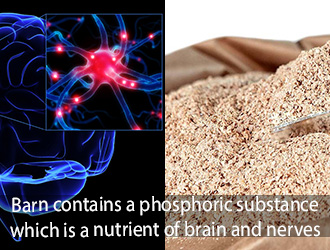 folates, it has also a phosphoric substance which is good for the brain and nerves, it has iron which is good for blood in terms of energy and strength besides bringing more oxygen from lungs to blood, it has calcium which builds bones and teeth, it has silicon which keeps the hair healthy and shining, it has iodine which is crucial to the thyroid gland, it has a pacifying and calming effect on the one who eats wheat bran and it has potassium, sodium and magnesium. Imagine, we feed all that to animals, and we eat starch only (by removing the bran and germ from the wheat grains and by using the rest only in bread). How foolish man is! The minerals the whole wheat grain contains contribute in constructing the tissues and the juices (which facilitates digestion). Yet, we remove the bran giving it to the animals and we eat the pure starch. It is said, "Beware of the three poisonous substances: the white sugar, the white salt and white flour."
folates, it has also a phosphoric substance which is good for the brain and nerves, it has iron which is good for blood in terms of energy and strength besides bringing more oxygen from lungs to blood, it has calcium which builds bones and teeth, it has silicon which keeps the hair healthy and shining, it has iodine which is crucial to the thyroid gland, it has a pacifying and calming effect on the one who eats wheat bran and it has potassium, sodium and magnesium. Imagine, we feed all that to animals, and we eat starch only (by removing the bran and germ from the wheat grains and by using the rest only in bread). How foolish man is! The minerals the whole wheat grain contains contribute in constructing the tissues and the juices (which facilitates digestion). Yet, we remove the bran giving it to the animals and we eat the pure starch. It is said, "Beware of the three poisonous substances: the white sugar, the white salt and white flour."
Dear brother, wheat bran is the best source of fiber which prevents colon diseases, as it helps digestion, and it is a natural laxative. Eating whole bran bread is good for constipation, so it is the best food for man when he is on travel, because it is healthy as it prevents constipation being a natural laxative, and it prevents 50 other colon diseases. Let us count again the elements in the wheat bran: six vitamins, phosphoric substance (which is good for the brain), iron (which is basic in blood), calcium (which is good for bones and teeth), silicon (which is good for hair), iodine (which is good for the thyroid gland), potassium, sodium and magnesium.
5- Sifting (removing bran from wheat) wheat and barley is one of the innovations of our era:
By Allah, for 20 years I have been eating only whole wheat bread, because it is healthy. If we boil the 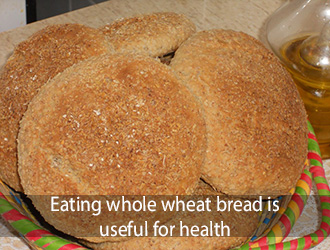 wheat bran in water, it can be used for cough and running nose, and it is also used for intestine spasms and peptic ulcer. Furthermore, it is good for the skin and it protects it. Eating white bread is against the Prophetic Sunnah, and sifting wheat is the first innovation that was innovated after the Prophet's death PBUH:
wheat bran in water, it can be used for cough and running nose, and it is also used for intestine spasms and peptic ulcer. Furthermore, it is good for the skin and it protects it. Eating white bread is against the Prophetic Sunnah, and sifting wheat is the first innovation that was innovated after the Prophet's death PBUH:
((Narrated Abu Hazim: I asked Sahl bin Sa'd, "Did Allah's Messenger (PBUH) ever eat white flour?" Sahl said, "Allah's Messenger (PBUH) never saw white flour since Allah sent him as an Apostle till He took him unto Him." I asked, "Did the people have (use) sieves during the lifetime of Allah's Messenger (PBUH)?" Sahl said, "Allah's Messenger (PBUH) never saw (used) a sieve since Allah sent him as an Apostle until He took him unto Him," I said, "How could you eat barley unsifted?" he said, "We used to grind it and then blow off its husk, and after the husk flew away, we used to prepare the dough (bake) and eat it."
Dear brother, again sifting wheat is the first innovation after the Prophet's death PBUH. Take this piece of advice which I give you for the Sake of Allah: Eat whole wheat bread which contains the whole wheat grain without removing its bran.

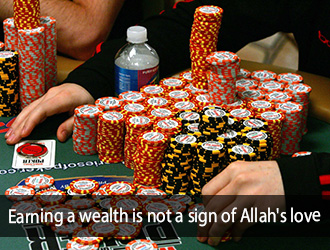 [Al-Fajr, 17]
[Al-Fajr, 17]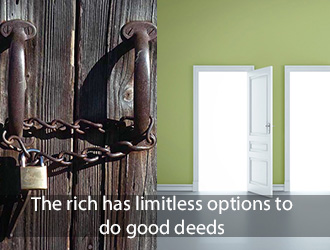 most likely you should be rich, because owning money gives power and makes limitless options available to the rich man to offer good deeds, unlike the poor one.
most likely you should be rich, because owning money gives power and makes limitless options available to the rich man to offer good deeds, unlike the poor one.


